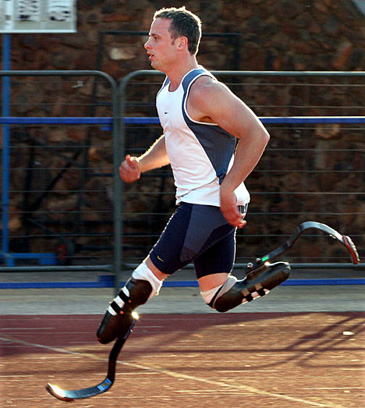Double-Amputee Runner Awaits Verdict
Credit: The Daily Mail, United Kingdom
The future of technology in sports is awaiting a ruling from the Court of Arbitration for Sport (CAS) in Lausanne, Switzerland, where Oscar Pistorius, a South African Paralympics runner, appealed a ruling by the International Association of Athletics Federations (IAAF) that banned him from competing against able-bodied athletes.

Pistorius is a double amputee who competes on J-shaped, carbon-fiber Cheetah blades made by the Icelandic company Össur. After competing in an international able-bodied event in 2007, allegations were made that Pistorius’s blades give him an unfair advantage over able-bodied athletes because he can cover more ground than they can and uses less energy than they do, and unlike theirs, his legs are not subject to fatigue. The IAAF–the athletic world’s governing body–promptly issued a ban on using technical devices, such as wheels and springs, that give one athlete an advantage over another in competition. It also decided to individually review Pistorius’s case.
Following German professor Gert-Peter Brüggemann’s testing of Pistorius’s prostheses and abilities against able-bodied runners, the IAAF ruled that the prostheses give Pistorius an unfair advantage over able-bodied runners because the results concluded he uses 25 percent less energy to compete than they do. Given the ruling, Pistorius was prohibited from competing in any IAAF able-bodied competitions, including the 2008 Summer Olympics in Beijing.
Infuriated by the results, Pistorius appealed to the CAS. The testing for the appeal was conducted by six universities in the United States and France and lead by MIT professor Hugh Herr. Their job was to look into the scientific claims made by the IAAF that banned Pistorius from competing. The scientific team concluded that the IAAF allegations were not scientifically valid.
The CAS arbitrators–Martin Hunter from England, Switzerland’s Jean-Philippe Rochat, and David Rivkin of the United States–are expected to deliver a verdict in the next few days on whether Pistorius can compete in able-bodied competitions. But their decision should not be individually and empathetically focused on Pistorius, as he has tried to make it in his appeal. The real issue is the use of technological devices in athletic competitions. The scientific evidence should be the backbone of the CAS ruling, but making the decision are three nonscientists. The CAS has a tough decision to make for the future of sports and the case will provide a legal precedent for how other similar cases involving technology in sports will be handled.
Keep Reading
Most Popular
Large language models can do jaw-dropping things. But nobody knows exactly why.
And that's a problem. Figuring it out is one of the biggest scientific puzzles of our time and a crucial step towards controlling more powerful future models.
The problem with plug-in hybrids? Their drivers.
Plug-in hybrids are often sold as a transition to EVs, but new data from Europe shows we’re still underestimating the emissions they produce.
How scientists traced a mysterious covid case back to six toilets
When wastewater surveillance turns into a hunt for a single infected individual, the ethics get tricky.
Google DeepMind’s new generative model makes Super Mario–like games from scratch
Genie learns how to control games by watching hours and hours of video. It could help train next-gen robots too.
Stay connected
Get the latest updates from
MIT Technology Review
Discover special offers, top stories, upcoming events, and more.